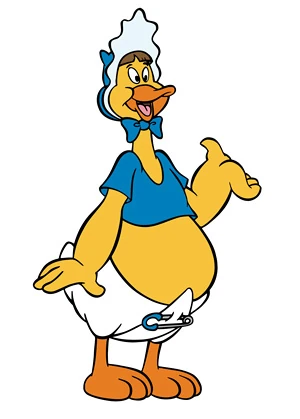| Baby Huey | |
|---|---|
 Baby Huey | |
| Publication information | |
| Publisher | Harvey Comics |
| Created by | Martin Taras |
| In-story information | |
| Full name | Baby Huey |
Baby Huey is a gigantic and naïve duckling cartoon character. He was created by Martin Taras for Paramount Pictures' Famous Studios, and became a Paramount cartoon star during the 1950s. Although created by Famous for its animated cartoons, Huey first appeared in comic-book form in an original story in Casper the Friendly Ghost #1 September 1949, published by St. John Publications.
Famous Studios[]
Huey first appeared onscreen in the Noveltoons short Quack a Doodle Doo, released in 1950. The character's voice was provided by Sid Raymond, an actor and comedian who created several other voices for Famous Studios' characters, including Katnip.
Many animated shorts featuring Huey had recurring themes. Most common among them was him trying to be just like any other kid his age. He would see his peers playing, and would immediately get excited. Whenever he tried to involve himself in the activities of his peers (also anthropomorphic ducklings) he would often inadvertently cause more problems, and as a result they would drive him away through trickery (and into tears). A hungry fox would show up, feigning friendship and setting traps along the way, all of which would prove ineffective on Huey and/or backfire on the fox. At first Huey was blissfully unaware of the fox's true agenda. But as his peers watched the annoyed fox in action from a safe distance (and fearing for his safety just as they did their own), Huey would come to realize the truth about his predator and dispose of him, usually by saying: "I think you're trying to kill me!", and would finish the fox. Other times, however, Huey would remain blissfully unaware and the exasperated fox would finally give up, fleeing Baby Huey before any more misfortune befell him.
Baby Huey had a sidekick in later comics. This was his slow-thinking cousin, whom he referred to as Cousin Dimwit. Dimwit was characterized as a fairly skinny duck in an oversized red woolen sweater, with sleeves that ran over his hands and hung down several inches.
Baby Huey's hairstyle inspired a surge of tiny bangs on men in the 1950s and 1960s. It is thought that Baby Huey's hairstyle was actually inspired by Moe of the Three Stooges. Baby Huey's influence on coiffure can be seen around the world.
Harvey Comics and later animated appearances[]
Harvey Hits #60 was the first Harvey-published comic book to feature the character. Baby Huey, the Baby Giant was the first comic to bear the character's name; spin-offs included Baby Huey in Duckland and Baby Huey and Papa.
Huey's parents, Papa and Mama Duck, always struggled to manage their overgrown son despite his overbearing weight and strength, which often resulted in damage to his family's house or car, injury to Papa, or a threat from Papa's boss to fire him if Huey harmed the boss or caused damage to his home or office. Huey's main sidekicks were small identical triplet ducks (who bore a striking resemblance to Donald Duck's nephews. Huey, Dewey and Louie) who resented or mocked Huey for his stupidity and clumsiness but depended on his superhero strength to get them out of trouble.
Characters who appeared in Baby Huey comic books in separate strips included Herman and Katnip and Buzzy the Funny Crow, who was always outsmarting a blue cat (who resembled Katnip) that tried to catch and eat him.
Harvey purchased the rights to all of Famous' original characters in 1959, and Huey continued to appear regularly in Harvey publications until 1972. Huey was rarely seen for nearly two decades afterwards, returning to comics in 1990.
Film Roman produced a new series of Baby Huey cartoons for television in 1994, which aired as The Baby Huey Show for one season. He also starred in a live-action direct-to-video film, Baby Huey's Great Easter Adventure, in 1999.
In The Spooktacular New Adventures of Casper segment entitled "Legend of Duh Bigfoot", Baby Huey makes a cameo at the end of that segment.
Baby Huey in Pop Culture[]
- U.S. President Bill Clinton in a 1993 conversation cited his similarities to Baby Huey: "I'm a lot like Baby Huey. I'm fat. I'm ugly. But if you push me down, I keep coming back."[1]
- The documentary Hype! references Baby Huey; by comparing it to different music revolutions that hit different cities at random times.